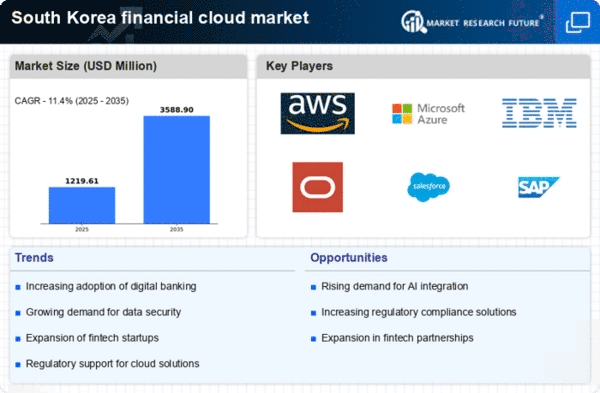Enhanced Data Analytics Capabilities
In the financial cloud market, the ability to harness data analytics is becoming increasingly critical for institutions in South Korea. Financial organizations are recognizing the potential of cloud-based analytics to derive actionable insights from vast amounts of data. This capability is particularly relevant as the market anticipates a 25% growth in data generation by 2026. By utilizing cloud platforms, financial institutions can analyze customer behavior, risk factors, and market trends more effectively. The financial cloud market thus stands to gain from the integration of sophisticated analytics tools, which can lead to improved decision-making and operational efficiency. As institutions strive to remain competitive, the demand for advanced data analytics within cloud environments is likely to escalate, further driving market growth.
Cost Efficiency and Operational Flexibility
Cost efficiency remains a pivotal driver in the financial cloud market, particularly for South Korean financial institutions. By migrating to cloud-based solutions, organizations can significantly reduce their IT infrastructure costs, with estimates suggesting savings of up to 40% in operational expenses. This financial cloud market trend is particularly appealing to smaller institutions that may lack the resources for extensive on-premises systems. Additionally, the operational flexibility offered by cloud solutions allows institutions to scale their services according to demand, which is crucial in a rapidly evolving financial landscape. As competition intensifies, the ability to optimize costs while maintaining service quality becomes a key differentiator, thereby fostering further investment in cloud technologies.
Rising Demand for Digital Financial Services
The financial cloud market in South Korea experiences a notable surge in demand for digital financial services. As consumers increasingly prefer online banking and mobile payment solutions, financial institutions are compelled to adopt cloud technologies to enhance service delivery. This shift is evidenced by a reported 30% increase in digital transactions over the past year. The financial cloud market is thus positioned to benefit from this trend, as institutions seek to leverage cloud capabilities for scalability and efficiency. Furthermore, the integration of advanced analytics within cloud platforms allows for improved customer insights, enabling tailored financial products. This growing consumer expectation for seamless digital experiences drives financial institutions to invest in cloud solutions, thereby propelling the financial cloud market forward.
Regulatory Adaptation and Compliance Solutions
The financial cloud market in South Korea is increasingly influenced by the need for regulatory adaptation. Financial institutions are under constant pressure to comply with stringent regulations, which necessitates robust data management and security measures. Cloud solutions are emerging as viable options for ensuring compliance, as they often come equipped with built-in security features and compliance tools. The financial cloud market is thus witnessing a shift towards providers that offer comprehensive compliance solutions, which can help institutions navigate the complex regulatory landscape. As regulations evolve, the demand for cloud services that facilitate compliance is expected to grow, potentially leading to a 20% increase in market adoption over the next few years.
Growing Collaboration with Technology Providers
Collaboration with technology providers is becoming a defining characteristic of the financial cloud market in South Korea. Financial institutions are increasingly partnering with cloud service providers to leverage cutting-edge technologies such as artificial intelligence and blockchain. This trend is indicative of a broader strategy to enhance service offerings and improve customer experiences. The financial cloud market is likely to benefit from these collaborations, as they enable institutions to access innovative solutions without the burden of extensive in-house development. As partnerships between financial institutions and technology providers expand, the market may see a 15% increase in the adoption of integrated cloud solutions, fostering a more competitive landscape.
















